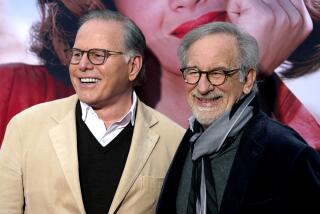Sy Weintraub; Produced Series of Tarzan Movies
- Share via
Sy Weintraub, motion picture executive and a former owner of Panavision who produced highly regarded versions of Tarzan and Sherlock Holmes films, died Tuesday. He was 76.
Weintraub died in his Beverly Hills home, said his publicists, Warren Cowan and Miriam Levin.
Dedicated to television as well as films, Weintraub held many titles at the pinnacle of entertainment--chairman of the board of Panavision, president of National General Television Corp., chairman of the executive committee of the board of Columbia Pictures Industries.
But even at the top of the game, Weintraub never forgot what he loved--or forgot to act on it. That included some of his old literary heroes, created by Edgar Rice Burroughs and Sir Arthur Conan Doyle.
In 1958, when other moguls had decided the Tarzan franchise was played out, Weintraub acquired the rights and started all over again. His 1959 “Tarzan’s Greatest Adventure” set the tone for his string of films, which movie historian Leonard Maltin calls “well-produced, British-made adventure tales.”
As executive producer, Weintraub took the man of the jungle out of studio back lots and filmed him on location in Africa, Asia, South America and Mexico. He also enhanced the cast with such diverse stars as Sean Connery, Anthony Quayle, Helen Hayes, Diana Ross and the Supremes, comedian Jan Murray and athlete/actor Woody Strode.
Weintraub arranged the distribution himself, helping pioneer “dollar gross” deals by agreeing to share gross theatrical revenue with the releasing studios, while retaining television rights and income. With that arrangement, Weintraub--and Tarzan--helped show the vast financial potential of television.
He also originated the late 1960s “Tarzan” series on NBC, starring Ron Ely in the loincloth.
Pursuing the oft-produced Sherlock Holmes rights in 1980, Weintraub talked to Doyle’s surviving daughter, Dame Jean Conan Doyle, and charmed her.
“I was very impressed by his feeling toward my father’s stories,” she told The Times in 1983. “His series will be faithful to the originals.”
Weintraub and producer Otto Plaschkes made two Holmes films in a 90-minute format adaptable to television in 1983, “The Hound of the Baskervilles” and “The Sign of Four” starring British actor Ian Richardson as Holmes. The movies finally were shown on television rather than in theaters. But again Maltin noted of “Hound” that it was “the best version of the Doyle classic [of five] to date, with excellent use of locations” and added, “This deserved theatrical release but didn’t get it.”
Weintraub bought Panavision, the camera-system supplier, in 1965 and sold it a few years later.
A native New Yorker, he served in the Army during World War II, directing Stars and Stripes productions. Afterward, planning to become a sportswriter, he earned a journalism degree at the University of Missouri, earning his way through school working as waiter and stoking furnaces.
He completed a television production course at the American Theatre Wing in New York, and, giving up on sports, borrowed $2,000 and helped form Flamingo Films, a neophyte television syndication company.
Weintraub created the concept for television’s late shows when he started providing all-night movie programming for Pittsburgh steelworkers.
In 1994, he returned to the campus of his alma mater in Columbia, Mo., as William Francis English Scholar-in-Residence and to accept its distinguished alumni award.
Twice married and twice divorced, Weintraub is survived by two daughters, entertainment executive Lori Weintraub of Los Angeles and actress Cindy Shrieve of Seattle; and four grandsons.
At Weintraub’s request, there will be no funeral.
More to Read
The biggest entertainment stories
Get our big stories about Hollywood, film, television, music, arts, culture and more right in your inbox as soon as they publish.
You may occasionally receive promotional content from the Los Angeles Times.









